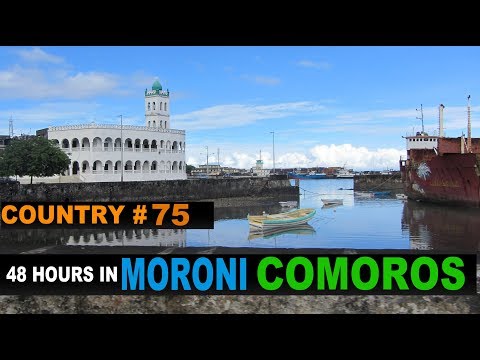
Nestled on the volcanic island of Grande Comore (Ngazidja) lies Moroni, the capital and largest city of the Comoros. With its blend of Swahili culture, Arabic influences, and stunning natural beauty, Moroni offers a unique destination for travelers seeking to explore an off-the-beaten-path gem. This guide provides insights into exploring Moroni, from its historical landmarks to its breathtaking landscapes.
#### Historical and Cultural Attractions
**The Old Friday Mosque (Ancienne Mosquée du Vendredi):** This historical mosque is a must-see in Moroni. Built with coral and showcasing traditional Comorian architecture, it stands as a testament to the island’s rich Islamic heritage. Its location near the harbor affords visitors picturesque views of the ocean.
**Badjanani Square:** As the main square in Moroni, Badjanani is often buzzing with activity. It is surrounded by government buildings and shops, making it a good starting point for tourists to feel the pulse of daily life in Moroni.
**Royal Palace of Iconi (Sultan’s Palace):** Just outside Moroni, the ruins of this palace offer a glimpse into the royal past of Comoros. Although in ruins, visiting this site provides context on the sultanate period that shaped much of the region’s history.
#### Natural Attractions
**Mount Karthala:** Dominating Grande Comore’s skyline is Mount Karthala, an active volcano that beckons adventurous spirits. Hiking up Karthala offers an exhilarating experience with rewarding panoramic views from its crater – one of the largest active craters in the world. It’s advisable to go with a guide who can ensure safety and provide valuable insights about local flora and fauna.
**Beaches:** No visit to an island capital would be complete without time spent on its beaches. The beaches around Moroni feature volcanic black sand—a rare sight—and pristine waters ideal for swimming and relaxation.
#### Markets and Shopping
Moroni’s markets are vibrant and colorful places where you can find everything from fresh produce to handmade crafts.
– **Volo Volo Market:** This bustling market is perfect for those looking to dive into local life. Here you can buy spices, perfumes, fabrics, and handmade jewelry typical of Comorian culture.
– **Artisanal Shops:** For unique souvenirs such as wood carvings or traditional musical instruments like ‘gabusi’ – a sort of zither played in many parts of East Africa – visit one of many artisan shops scattered throughout the city.
#### Cuisine
Influenced by African flavors and infused with spices like vanilla (a major export), cardamom, and clove; Comorian cuisine is both unique and tantalizing.
– **Local Dishes:** Try ‘langouste à la vanille’ (lobster cooked in vanilla sauce) or ‘mataba’ (cassava leaves cooked with coconut milk). These dishes represent a fusion that characterizes much of Moroni’s food culture.
– **Street Food:** For a taste on-the-go, sample some ‘sambusas’ (similar to Indian samosas) or grilled fish sold by street vendors.
#### Practical Information
– **Getting There:** International flights come into Prince Said Ibrahim International Airport located just north of town.
– **Getting Around:** Taxis are readily available but be sure to negotiate rates beforehand. Renting a car might be preferable for those planning extensive exploration outside Moroni.
– **Language:** French is widely spoken owing to colonial history; however Swahili forms part of everyday conversations too.
– **Currency:** The currency used is the Comorian franc (KMF).
Moroni stands out as an enchanting destination rich with cultural heritage set against an impressive backdrop of natural beauty. Whether you’re exploring historic sites or enjoying idle hours at sea-kissed beaches under swaying palms—the capital city of Comoros promises memories that will last a lifetime!
